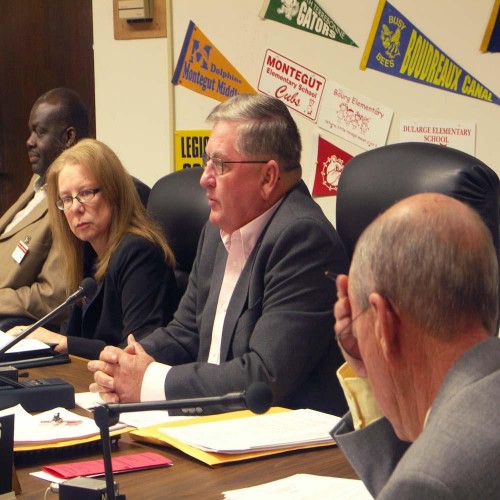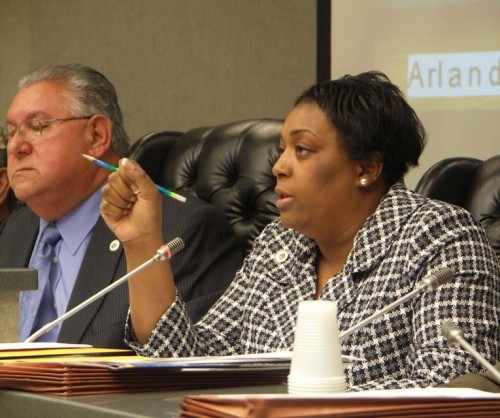
Terrebonne school board grants levee district passage
February 15, 2011
Resolution bid draws council fire
February 17, 2011The only thing Terrebonne Parish Councilmen Johnny Pizzolatto, R-Dist. 5, and Alvin Tillman, D-Dist. 1, agree on when it comes to the placement of oilfield waste disposal wells, also known as saltwater injection wells, is their desire to hear from the public when the matter comes up for final approval on Wednesday, Feb. 23.
The matter came to the forefront when management with Vanguard approached Pizzolatto, who represents parts of Houma reaching from Terrebonne High School through the downtown area and to vicinity of Coteau and Prospect Roads, about building such a well on their property.
Tillman, whose district of representation covers a portion of downtown, east Houma, Mercantile, Village East and the upper portion of Bayou Dularge, has said that although the proposal would not involve his district directly he is concerned if it would open a door of opportunity and future waste disposal concerns for the entire parish.
Currently, the state of Louisiana requires that oilfield waste wells be 500 feet from a residential area. Terrebonne Parish ordinances require a distance of one mile. A proposal placed on the council agenda by Pizzolatto would change that requirement to match state standards.
“One of the biggest concerns I have is not just where are you going to put these well but what are you going to put into these wells,” Tillman said.
“We just don’t know. I don’t know what is going in there. But I do realize that whatever is going in there is something you are not allowed to just put anywhere. You have to have some type of containment for it.”
Pizzolatto explained that there are 78 active saltwater wells throughout Terrebonne Parish. “Some of them are located on Hollywood road across from K-Mart and they are scattered everywhere. But they’re not commercial,” Pizzolatto said.
Pizzolatto said that typically when an oil well is drilled a saltwater injection well is placed on site to contain brine from drilling location. These wells are easily permitted when they are not commercial in nature. “We have one commercial well [on Coteau Road] in Terrebonne and it has been there for 30 years. They are non-commercial but they are used the same way a commercial well is,” he said.
Pizzolatto said that concern over his proposal to permit a new saltwater-injection well is a matter of overreaction.
Vanguard wants to put in a well on a one-acre tract next to their building on La. Highway 182, according to Pizzolatto. The company has secured permits for waste disposal saltwater brine from the state, but has to gain approval from the Terrebonne Parish Council because of the one-mile restriction.
“I have been discussing this with a number of people outside of Vanguard but still in the oil business. They are telling me it is perfectly safe if you go below 2,200 feet with the well. Vanguard is going down 4,800 feet,” Pizzolatto.
Vanguard has said that in addition to the well a bank of concrete will be added to contain any unexpected spill. Fresh water would be pumped into the well to avoid any leakage problems.
“Only because it is commercial [are] people getting upset,” Pizzolatto said. “We’ve [already] got 78 of them in people’s back yards and we’ve never had an incident that was caused by an injection well. We’ve had a lot of problems with open pits. But the ordinance we are proposing does not change that. There will be no open pits allowed in Terrebonne Parish.”
“When it comes to us relaxing the rules and guidelines we have, I do have an issue with that. I dealt with a similar situation off [La. Highway] 315 going to the Dularge area,” Tillman said. “We had a proposed saltwater injection well there. The biggest concern that residents had was, ‘If that well is placed there how does it effect us?'”
“With the new proposal to take the mile [distance] we have and reduce that, I’m wondering whether or not if the code is actually changed if that will open Pandora’s Box for others to come in, and will we have to deal with the other [companies] that applied to come in but couldn’t. If we change the rules they would not have to come to us [for approval] because they would be within that one-mile radius. They would have to [get a proposal] from the state,” Tillman said.
Tillman noted having another concern on the proposed ordinance, which reads “salt water and other matters” and said that line leaves open an opportunity for a potentially hazardous situation. “It is that unknown ‘other’ that concerns us,” he said.
“I’ve gotten calls and I can appreciate people being concerned about the environment, but sometimes we go overboard with the laws because we are not educated enough to know what’s going on,” Pizzolatto said. “The only reason I think we need to relax [parish standards for the distance of wells from residential areas] is because the state law is the one that governs everything. I’m afraid we are overstepping the boundary of the governing body of Terrebonne Parish.”
The current one-mile limit for wells to be placed from residential areas resulted several years ago with a leak killed some orange trees. Pizzolatto said that was an unfortunate situation to which parish officials at the time overreacted. “I don’t think you can put a well anywhere in Terrebonne Parish with a radius one-mile from a residential area. It just can’t happen,” he said.
Pizzolatto fears that restricting the placement of saltwater injection wells limits beyond the state’s required 500 feet would in time subject the parish to litigation. Tillman fears that not maintaining the stricter guideline of one mile might end up doing the same.







